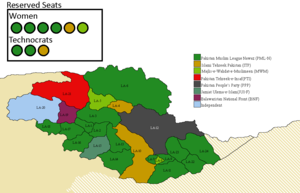2015 Gilgit-Baltistan Assembly election
| ||||||||||||||||||||||||||||||||||||||||||||||||||||||||||||||||||||
| Registered | 618,364[1] | |||||||||||||||||||||||||||||||||||||||||||||||||||||||||||||||||||
|---|---|---|---|---|---|---|---|---|---|---|---|---|---|---|---|---|---|---|---|---|---|---|---|---|---|---|---|---|---|---|---|---|---|---|---|---|---|---|---|---|---|---|---|---|---|---|---|---|---|---|---|---|---|---|---|---|---|---|---|---|---|---|---|---|---|---|---|---|
| Turnout | 61.29%[1] | |||||||||||||||||||||||||||||||||||||||||||||||||||||||||||||||||||
| ||||||||||||||||||||||||||||||||||||||||||||||||||||||||||||||||||||
 Map of Gilgit Baltistan showing Assembly Constituencies and winning parties | ||||||||||||||||||||||||||||||||||||||||||||||||||||||||||||||||||||
| ||||||||||||||||||||||||||||||||||||||||||||||||||||||||||||||||||||
The 2015 Gilgit-Baltistan Assembly elections were held on 8 June 2015.
618,364 voters in Gilgit-Baltistan had the ability to exercise their right to vote in the elections and were able to vote across the province.[1] 329,475 of the people registered to vote were male and 288,889 were female (a gender gap of 8%).[5]
Background
In 1970, the
In 2009, the Government of Pakistan passed "The Gilgit-Baltistan Empowerment and Self-governance Order, 2009, and the President of Pakistan Asif Ali Zardari. This order renamed the Northern Areas as "Gilgit-Baltistan" and gave it a limited amount of internal autonomy within Pakistan and self-governance by allowing the people of Gilgit-Baltistan to have elections, where they could elect members of the "Gilgit-Baltistan Legislative Assembly". The position "Chief Minister of Gilgit-Baltistan" was also made. The Assembly would have five-year-long terms.[7]
The first Gilgit-Baltistan elections
Campaign and Polling
495 candidates from different political parties and Independents submitted their nomination papers out of which 50 nominations were rejected. 445 candidates took part in elections. Parties like
Polling took place on June 8, 2015 without any break from morning 8 am to evening 4 pm. Total number of 1143 polling stations were set up across the province. Out of 1143 polling stations, 282 were declared highly sensitive, while 269 polling stations were declared sensitive. About 5500 Military Soldiers along with 4356 policemen were deployed to perform security duties to make peaceful polling across the province.[9][10]
Results
Pakistan Muslim League (N) emerged as the majority party by winning 15 out of 24 general seats. Taking into account the 4 out of 6 women seats and 2 out of 3 technocrat seats that they successfully gained, their seats increased to 21. They won a lopsided majority in the assembly.
Jamaat-e-Islami Pakistan 3,237 | 0.85 | 0 | 0 | 0 | 0 | –1 | | ||||||||
|---|---|---|---|---|---|---|---|---|---|---|---|---|---|---|---|
| Muttahida Qaumi Movement | 591 | 0.16 | 0 | 0 | 0 | 0 | –1 | ||||||||
| Other parties | 5,842 | 1.54 | 0 | 0 | 0 | 0 | – | ||||||||
| Independents | 49,336 | 13.02 | 1 | 0 | 0 | 1 | –3 | ||||||||
| Total | 379,032 | 100.00 | 24 | 6 | 3 | 33 | 0 | ||||||||
| Registered voters/turnout | 618,364 | – | |||||||||||||
| Source: ECGB | |||||||||||||||
Aftermath
The newly elected assembly members took oath on 24 June 2015.[11] Hafiz Hafeezur Rehman was elected as 2nd Chief Minister of Gilgit Baltistan unopposed. He took oath on 26 June 2015.[12]
Notes
- ^ There are 33 seats total in the Gilgit-Baltistan Assembly. Six seats are reserved for women, three seats are reserved for technocrats, and these nine seats are allocated using proportional representation. More information on the allocation of these seats is given in the section "Government formation" of this article.
References
- ^ a b c d e "ELECTIONS 2015 - RESULT OF ELECTION, 2015". ELECTION COMMISSION GB. ELECTION COMMISSION GILGIT-BALTISTAN. 2015. Archived from the original on 6 November 2020. Retrieved 25 November 2020.
- ^ Mahmud, Ershad (7 June 2015). "The battle for Gilgit-Baltistan". The battle for Gilgit-Baltistan | thenews.com.pk. The News International. Archived from the original on 25 November 2020. Retrieved 25 November 2020.
- ^ "Members". Members - Gilgit-Baltistan Assembly. Gilgit-Baltistan Assembly. Archived from the original on 15 February 2020. Retrieved 25 November 2020.
- ^ "Election Commission Gilgit-Baltistan". Election Commission GB. Archived from the original on 23 September 2020. Retrieved 25 November 2020.
- ^ Amir Wasim (9 November 2020). "Gender gap among GB voters widens: Fafen". Gender gap among GB voters widens: Fafen - Pakistan - DAWN.COM. DAWN.COM. Archived from the original on 14 November 2020. Retrieved 14 November 2020.
- ^ a b "GB Elections 2020: Who is likely to win?". GB Elections 2020: Who is likely to win? - Global Village Space. Global Village Space. 2 November 2020. Archived from the original on 27 November 2020. Retrieved 27 November 2020.
- ^ "AN ORDER" (PDF). TO BE PUBLISHED IN THE NEXT ISSUE OF THE. GOVERNMENT OF PAKISTAN MINISTRY OF KASHMIR AFFAIRS AND NORTHERN AREAS. 9 September 2009. Archived (PDF) from the original on 14 November 2020. Retrieved 27 November 2020.
- ^ "Political parties announce candidates for GB elections | Pakistan Today". www.pakistantoday.com.pk. Archived from the original on 2019-07-05. Retrieved 2019-07-05.
- ^ "GB Legislative Assembly elections today". www.thenews.com.pk. 2015-06-07. Archived from the original on 2019-07-05. Retrieved 2019-07-05.
- ^ "Abbtakk.tv: Latest News Breaking Pakistan, World, Live Videos". Abb Takk News. Archived from the original on 2019-07-04. Retrieved 2019-07-05.
- ^ Tribune.com.pk (2015-06-25). "Maiden session: 33 members of G-B Assembly take oath". The Express Tribune. Archived from the original on 2019-08-07. Retrieved 2019-07-21.
- ^ Correspondent, The Newspaper's (2015-06-27). "Hafeezur Rehman sworn in as new GB chief minister". DAWN.COM. Archived from the original on 2019-07-21. Retrieved 2019-07-21.
External links
- Election Pakistan, retrieved 19 October 2018





